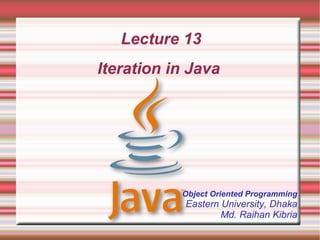
Oop lecture9 13
- 1. Lecture 13 Iteration in Java Object Oriented Programming Eastern University, Dhaka Md. Raihan Kibria
- 2. Simple c-style iteration public class IterationDemo { public static void main(String[] args) { List<String>lst = new ArrayList<String>(); lst.add("One"); lst.add("Two"); lst.add("Three"); for (int i=0; i<lst.size(); i++) System.out.println(lst.get(i)); } } Output: One Two Three
- 3. More iterators //more eye-friendly iteration for (String s : lst) System.out.println(s); Gives the same output Most generic iteration—using Iterator Iterator<String>it = lst.iterator(); while (it.hasNext()) System.out.println(it.next()); Gives the same output
- 4. Iterating over a set Set<String>s = new HashSet<String>(); s.add("One"); s.add("Two"); s.add("Three"); Iterator<String>it = lst.iterator(); while (it.hasNext()) System.out.println(it.next()); Gives the same output: One Two Three
- 5. Iterating over a map Map<String, String>map = new HashMap<String, String>(); map.put("One", "111111"); map.put("Two", "222222"); map.put("Three", "333333"); Iterator<Map.Entry<String, String>>it = map.entrySet().iterator(); while (it.hasNext()){ Map.Entry<String, String>entry = it.next(); System.out.println(entry.getKey() + "--" + entry.getValue()); } Output: Three--333333 One--111111 Two--222222
- 6. Remember old style iteration still works for arrays String[] str = new String[]{"One", "Two", "Three"}; for (int i=0; i<str.length; i++) System.out.println(str[i]); Output: One Two Three String[] str = new String[]{"One", "Two", "Three"}; for (String s : str) System.out.println(s); Output: One Two Three
- 7. Some common methods present in all objects toString() equals() hashCode() finalize()
- 8. toString() public class Student { int id; String name; public Student(int id, String name) { super(); this.id = id; this.name = name; } public String toString(){ return this.id + "--" + this.name; } } public static void main(String[] args){ Student student = new Student(3, "Joe"); System.out.println(student); } Output: 3--Joe
- 9. Another toString() demo List<Student>stus = new ArrayList<Student>(); Student st = new Student(1, "John"); stus.add(st); stus.add(st); System.out.println("Printing list: "); for (Student s: stus) System.out.println(s); Output: Printing list: 1--John 1--John
- 10. hashCode() demo with equals() public class HashCodeDemo { public static class Student { int id; String name; public Student(int id, String name) { super(); this.id = id; this.name = name; } public String toString() { return this.id + "--" + this.name; } /* public boolean equals(Object obj) { Student arg = (Student) obj; return this.id == arg.id; }*/ public int hashCode() { return this.id; } }
- 11. public static void main(String[] args) { Map<Student, String> map = new HashMap<Student, String>(); map.put(new Student(1, "John"), null); map.put(new Student(1, "John"), null); map.put(new Student(2, "John"), null); System.out.println(map.size()); Iterator<Map.Entry<Student, String>> it1 = map.entrySet().iterator(); System.out.println("Printing map: "); while (it1.hasNext()) System.out.println(it1.next()); } } Output: Now we uncomment the equals() method in the 3 previous slide: Printing map: 1--John=null Output: 1--John=null 2 2--John=null Printing map: 1--John=null 2--John=null Explanation: hashCode merely specifies a slot; equals() helps put the object in the slot
- 12. equals() method Two objects are equal if their equals() method returns true. Demo: public class Student { int id; String name; public Student(int id, String name) { super(); this.id = id; this.name = name; } public String toString(){ return this.id + "--" + this.name; } public int hashCode() { return this.id; } public boolean equals(Object obj) { Student s = (Student)obj; if (s.id == this.id) return true; return false; }
- 13. equals() continued System.out.println(st.equals(st2)); System.out.println(st==st2); Output: true false In java “==” operator is not same as “equals()”
- 14. finalize() What is garbage collection? In C/C++ the programmer can get a chunk of program using malloc() and can dispose memory using memfree() Having programmer free will at memory management resulted in memory leaks in many C programs Java will not let programmer directly acquiring memory. Rather JVM manages memory
- 15. Finalize() (c..) • When an object is de-referenced, the object is automatically removed from the memory by JVM. • Whenever, an object is removed its finalize() method is called • Garbage collection is automatically scheduled by the JVM • However, a programmer can trigger a garbage collection by calling System.gc() • Example in the next page:
- 16. Finalize() (c..) public class AnObject { protected void finalize() throws Throwable { super.finalize(); System.out.println("Finalize method is called"); } public static void main(String[] args){ new AnObject(); } } Output:
- 17. Finalize() (c..) public class AnObject { protected void finalize() throws Throwable { super.finalize(); System.out.println("Finalize method is called"); } public static void main(String[] args){ new AnObject(); System.gc(); } } Output: Finalize method is called
- 18. Garbage collection formally defined Garbage collection is a mechanism provided by Java Virtual Machine to reclaim heap space from objects which are eligible for Garbage collection
